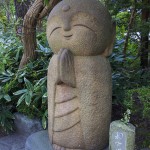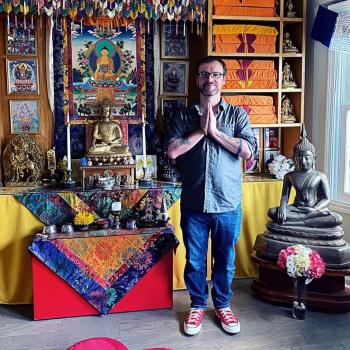When I was a kid my family went to church.
We didn’t go every Sunday, we probably went once or twice a month. I’m not 100% sure. But the point is we didn’t go all the time. When I was a kid I remember the church selling their building to developer and building a new one, fancy, better location. There’s a Best Buy there now. I suppose the move isn’t really relevant, just a minor detail, really memorable thing from my childhood and something for my local friends. The Best Buy that’s by Oak Park Mall used to be my church.
It’s strange that there was ever a church there, really.
I don’t remember much. Not a word of sermons or Sunday school has stuck with me. But there’s something I do remember, and that is what happened when my dad got sick. When he was diagnosed with terminal stomach cancer people started bringing us food. It started out small, one family would bring us food once a week. Then it grew. People whose names I didn’t even know were bringing us food every night. My mom could worry about my dad instead of worrying about feeding the family. This went on for what seemed like a long time. Weeks and weeks.
But what happened when we went back after he died is what I really remember. People hugged and asked how she was doing, in that special way that people ask when they really want to know. She cried more there that first day back at church than she did at the funeral, more than I cried at all. She was so moved.
We only went a handful of times after that. I don’t know why. Maybe the “are you ok?” head tilt that inevitably comes with such things got to be too much for her. It certainly got to be too much for me. By the time she got sick we definitely hadn’t gone for a long time.
Why am I writing about this?
Support is one of the functions of the spiritual community. There’s a story where one of the Buddha’s students said, “You know, I think spiritual friendship is at least half of the way,”
And the Buddha replied, “No, spiritual friendship is the whole of the way.”
He was saying that having a spiritual community is really really important. And I wonder if we’re lacking that area in most Buddhist communities. Sangha, or spiritual community, is one of the three jewels, really central to the path. We’re supposed to take care of each other. Sangha should be a second family, a helpful thing for orphans like me.
I’ll tell you a story.
Two years ago my marriage fell apart and I lost everything. I went through a bitter divorce and I’m still dealing with the consequences of that now. I started going to temple all the time to make myself feel better. But, it wasn’t because I was getting support. I wasn’t really getting very much. There weren’t people asking how I was doing. I started going all the time because I thought it was a safe place. And because I needed something to stop me from just getting drunk on all my kid free nights, which was the direction I was headed in.
A sadder story. A friend of mine at the temple had a brain tumor and he was put on hospice care. He stayed in hospice care for about a week. I visited him and I’m really glad I did. He left two young children behind, so it’s very sad. So often we wish we could have seen people one last time. I had that chance with my friend. But very very few people from the sangha took that opportunity. I still don’t know why.
Now, my intent is not to lament the state of my local temple or to shame the people in it, far from it. I think this is absolutely the normal situation in Buddhist communities throughout the west. Many people are holding on loosely, rather than being fully engaged. I’m telling these stories because this is the norm.
I want to ask “Why?”
We aren’t less compassionate. Maybe we’re just more independent. The context I practice in is convert Buddhism. That is, I wasn’t raised to be a Buddhist. And every Buddhist is also a convert Buddhist. It takes a certain independent streak to walk away from whatever spiritual tradition you’re raised in (or none at all) and explore another one. Not only that, but also independence is sometimes celebrated in Buddhism. The Buddha’s last words were, “Be a lamp unto yourselves.”
So maybe people come into it with a more independent mindset. Buddhist communities just aren’t close-knit most of the time. I’ve seen a lot of people come and go over the years and I think part of the reason is that some people are showing up and aren’t getting what they need. So they’re leaving, and maybe they don’t even know why.
Also, things are a little different, being in a society where another religion is a big majority. When I was kid the minister from the church performed the funerals for both of my parents. Most convert Buddhists don’t have Buddhist funerals, or Buddhist weddings. These things serve as community builders and we’re just not doing them, for a variety of reasons.
There are communities of people who were raised in Buddhism. It wouldn’t be fair to forget to mention them. They’re sometimes called ethnic Buddhists, but I don’t like that term. I want to just call them people who were raised in Buddhism. Here in Kansas City there’s a Vietnamese Buddhist temple and a Laotian Buddhist temple. They have temple services in their native languages and do a lot to serve these immigrant communities. I’m certain they are close knit in all the ways that we are not.
Is it important to have close knit sanghas?
I think so. Sanghas should be able to fulfill all of the needs people have for spiritual communities. We should strive to be welcoming, encouraging, and warm. We should talk to each other more, help each other more, and spend more time together.
What can we do?
I think change can’t come from the top down. We have to be the change. Ask someone how they’re doing and really mean it. If you find out someone in your community is in trouble, try to help. Get to know everyone. Step outside your comfort zone. Be more friendly and a lot less judgmental.
We’re all in this together.
————————————————————————————
Daniel Scharpenburg is a meditation instructor and dharma teacher in Kansas City. He regularly gives teachings through the Open Heart Project, the largest virtual mindfulness community in the world.
Find out more about Daniel on his website and connect with him on Facebook.
You can support independent Buddhist writing by joining a community of fellow learners/practitioners at Patreon













